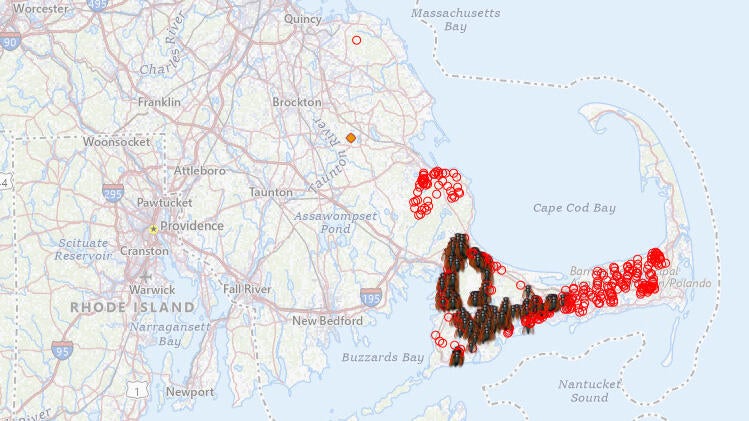Cicadas are coming to Massachusetts soon. Here's what to know about when and where Brood XIV will emerge.
The cicadas are coming, and this time Massachusetts won't be left out. A particularly large group of periodical cicadas known as Brood XIV, or the "Great(er) Eastern Brood," will emerge in 2025 after 17 years underground.
Brood XIV "is as big as it gets for 17-year cicadas," University of Connecticut professor John Cooley, a cicada expert, tells WBZ-TV.
When will the Brood XIV cicadas emerge?
Cooley expects Brood XIV cicadas to emerge in late May or early June. Until now, he explains, they've been spending their lives underground, feeding on plant roots.
"This is the spring for them to come above ground. They come up, they molt, and they turn into adults," Cooley said. "They have a couple of weeks to get adult things done, which involves mating and laying eggs. Then the adults die and it will all be gone before you know it and we start the cycle over again."
Map shows where cicadas will emerge in Massachusetts
Brood XIV's range is extensive, Cooley says, ranging all the way from Cape Cod to Long Island and down into northern Georgia.
The emergence of cicadas in Massachusetts will be concentrated in one particular area, a map from UConn shows.
"It gets very patchy ... it's going to be on Cape Cod and weirdly enough it's kind of just over the bridges, just over the canal on the Cape Cod side to just about the elbow," Cooley says. "From a conservation perspective, the concern is that this patch is so small that it could easily be driven extinct. So we are all waiting to see what emerges this June."
Cape Cod is a curious place for cicadas to make their home, Cooley says.
"They don't like sandy areas so I don't know why they're on Cape Cod and Long Island," he said.
How do cicadas make noise?
Cicadas are known for being noisy when they emerge.
"It's gonna be loud," Cooley said.
Male cicadas have special sound-producing organs, and their singing can reach as loud as 90+ decibels, which is about as loud as a lawnmower or hair dryer. Only the males make loud noises.
"So you're only going to hear half of the cicadas out there because the females, they can make sounds but they are very quiet, they don't have these sound-producing organs," Cooley said.
Do cicadas hurt the trees?
Unlike the invasive and damaging gypsy moths known for damaging trees, cicadas are native to North America.
"The species themselves go back a couple of million years, so they have made their peace with our forests," Cooley says.
Cicadas laying eggs on trees can cause the ends of twigs to turn brown and die, but they don't seem to have any significant long-term effects on trees, Cooley says.
"It'll look kind of strange in places, especially where they're very dense. But in the end it's just part of our Eastern deciduous forests," he said. "And it really is something quite unique, there's nowhere else in the world you can go and see anything quite like this."
Is climate change affecting cicadas?
The climate has always affected cicadas and where they live, Cooley explains.
"What was Cape Cod like 10,000 years ago? This was an area that was glaciated, so they certainly weren't living there," he said.
But scientists predict that a rapidly warming climate could cause cicadas to emerge earlier in the year, and it may cause "stragglers" from other broods to emerge when they're not supposed to.
"Plenty of cicadas in Broods I and X are going to make mistakes this time around, and they're going to get reported as Brood XIV," Cooley said. "They're not really Brood XIV, they're just stragglers."
Are cicadas harmful to dogs or people?
Cicadas don't bite or sting, and they're not toxic. But you don't want to let your dog to start chowing down on them.
"[Dogs] get severely clogged up if they eat too many," Cooley said. "And I leave it to your imagination what that looks like in a dog, but it ain't pretty."
For humans, eating cicadas might not be the best idea either, because there is research that says the insects absorb mercury.
"You could be eating a little dose of mercury," he said. "They're not approved for food use, they're not tested, so you don't know."




